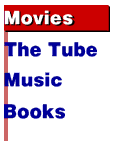|
| |||||||||||||||||||||
|
APRIL 2000 | VOL. 4, NO. 4 FEATURE
RELATED ARTICLE
ALSO THIS MONTH
LAST MONTH
The Whole Nine Yards: Cookie-cutter crime caper boasts quality acting, even from Willis, and an intricate plot.
|
In the midst of this is the Academy Awards, steeped in tradition. It's safe to say that people have a love hate relationship with the Oscars and therefore it becomes a simultaneously rewarding and frustrating experience as you watch. Cutting the dance numbers, (except in the GAP ads that paid tribute to West Side Story) was definitely a good move, but in some sense people really don't mind or care about the length, only the affiliates do. As an award show, this one managed to remove a lot of the goofy, silly, embarrassing and stupid. It was slick, lulled a bit at times, but overall, well done. The traffic jams off stage as people exited was an interesting perspective. Presenting the best song nominees consecutively was effective. One little glitch, though, was Issac Hayes drowning in special effects fog while performing "Shaft." "Blame Canada," featuring Robin Williams' vocals, from South Park was a highlight. Surprises? The Matrix shut out Star Wars Episode I: The Phantom Menace taking four sound and special effects awards. American Beauty as expected, took five, including Best Picture, and is probably the darkest film to win the top honor since 1991's winner, Silence of the Lambs. Hillary Swank's (Boys Don't Cry) win for Best Actress showed that the academy is open to provocative performances. (See accompanying sidebar for full list of winners) Michael Caine's (The Cider House Rules) acceptance speech for Best Supporting Actor must be the most gracious on record, spending almost as much time paying tribute to the performances of the other nominated actors as on himself. So the only other main issue is the impression that Denzel Washington was snubbed in the Best Actor race, but does voting for a minority actor in a role in and of itself display objectivity and open-mindedness? The problem is much deeper than whether minorities are adequately represented at the Oscars. It has to do with the industry itself. But this is also not an industry where quotas can be imposed. Most people never come close to succeeding and the reasons may vary from lack of talent to lack of luck. That is the reality, and it won't change. The odds are stacked against everyone equally. Absolutely, minorities should be represented more in front and behind the camera. But the reality is, movies have to make money and the stars have to be bankable. Is Tom Cruise, Julia Roberts, Will Smith or Eddie Murphy (at his peak) worth $15-20 million a picture? Sure, as long as the movies make money. It's not a level playing field; rather it is a playing field based heavily on who people know -- a relatively small and insular group. The film industry never has been fair, and it never will be. We complain and bemoan what the Oscars should and shouldn't be but it only mirrors the industry. You could even call it a kangaroo court. Speilberg couldn't get arrested at the Oscars for many years. Tom Cruise, nominated this year for Best Supporting Actor for his work in Magnolia, still has not won after several standout performances over the years. That's how it goes sometimes.
Academy members often compensate for past oversights by rewarding a less stellar performance. Al Pacino won for Scent of a Woman, not his best work, but weren't they really giving him the Oscar for The Godfather and Dog Day Afternoon and many other performances? I suspect the same will happen to Denzel Washington to honor his great work in Malcolm X and Hurricane. He's overdue -- no one argues with that -- but so are many other great talents. One last observation regarding accuracy in movies: Some people have suggested that the lack of veracity of Hurricane hurt its chances. The same could be said about The Insider not being completely accurate. So what? Does it really matter? One cannot expect movies to be exact depictions of the reality of people's lives and events. If you look to movies for factual information then you're in a great deal of trouble. If a film piques your interest, causing you to read up and look into an issue or event on your own with a critical mind, then congratulations: You're thinking. For example, Oliver Stone's JFK is a great movie, but I don't believe for a minute in the presented conspiracy. However, the paranoia and futility of getting to the truth of the Kennedy assassination is still captured. The emotional history, as it were, is dead on. But I don't believe the evidence or information presented to support a conspiracy theory. Not for a second. I think it's the collaborative futility of trying to impose meaning on a senseless act. I guess one could conclude that the Academy Awards is actually a four hour Rorschach test, revealing the subjective views of the film industry. What's your take? TIM CLIFTON is Renaissance Online Magazine's staff movie reviewer.
PICTURES copyright © 2000 Gary Hershorn/Reuters (Stage, Michael Caine), Sam Mircovich/Reuters (American Beauty Winners), AP Photo/Kevork Djansezian, File (Swank); copyright © 1999 Dream Works Pictures (American Beauty).
| ||||||||||||||||||||

| |||||||||||||||||||||
 |
|||||||||||||||||||||
|
Full Issue Contents | FEEDBACK | Questionnaire | Archive | Free Subscription | |||||||||||||||||||||









